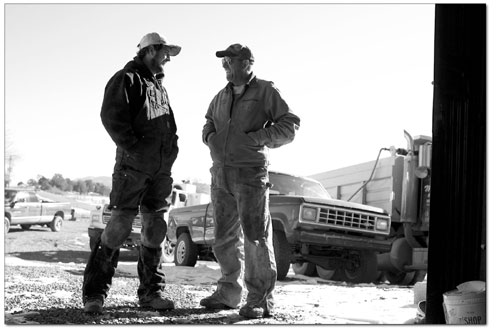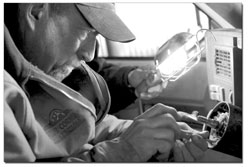| ||||
A different type of trench
by Jeff Mannix Jim Ferrell left La Plata County to join the fight in Iraq with a wrench. He was shot at, bombed, suffered the usual battle-front deprivations and discipline, was told when to sleep and eat and bathe, and was armed only with tools in his hands. He arrived back home in Allison this past July, after serving a 12-month tour at two military bases near Baghdad as a contract employee of KBR, an end-market division of Halliburton Co., under contract to provide support services around the globe to the U.S. Department of Defense. The U.S. wars in Iraq and Afghanistan are peopled with all-volunteer combatants and entirely out-sourced support personnel, including engineers, administrators, cooks, construction contractors, security specialists, material transports, laborers, equipment operators and mechanics. In this capacity, Jim Ferrell was a heavy equipment mechanic. “I had two sons in Iraq, one in the Army and the other in the Marines, so if they were overseas fighting for our country, I just felt that I had to do my part, too,” says Ferrell, 51, who served a tour of combat duty in Vietnam with the Marines. “How can you ask your kids to do something and not support them?” Ferrell’s recent tour in Iraq started with two weeks of training in Dallas. “Mostly we were instructed in what to expect in the country, how to behave in a Muslim world and how to stay alive,” he said. Then on Aug. 27, 2005, he was flown to Dubai and then on to Baghdad the next day. From Baghdad, he was transported with 630 other KBR employees to Camp Anaconda, an American base created around an existing airfield outside Ballad, Iraq. The compound has a footprint 21 miles long and 16 miles wide, is fenced with chain link topped by razor wire, patrolled continuously by spotting towers and armed guards and was constructed and is manned by contract labor. Within the fenced perimeter, Camp Anaconda has a resident population of 30,000, both military and civilian. “It was a city, with streets, warehouses, maintenance shops, residences, stores and even a swimming pool,” Ferrell said with a chuckle, seemingly about the swimming pool. “We were in the middle of a desert of sand; you could see miles in any direction, but that didn’t keep us from being shot at and mortared a half-dozen times a day.” Ferrell was billeted, like the other contract employees, in an 850-square-foot shipping container, with two rooms on either side and a bathroom in the middle.
On a given day, he was picked up by bus at 6 a.m. and transported to the motor pool, a giant area spanned only by a roof to deflect sun, which would heat the area in summer to temperatures exceeding 145 degrees. “We worked 12-hour days, seven days a week, and much of the time we had to repair convoy vehicles outside in the sun, which was murderous,” he said. “We drank bottled water all day, gallons of it, continuously, to keep from falling over in the unbelievable heat. We worked 10 minutes on and 50 minutes off.” Those 50 minutes, however, were seldom used for R&R. “Usually a truck or two from a convoy would come limping in all shot up or blown half apart, and we’d jump up and go to work to get the guys back in the field where their buddies were left holding ground,” Ferrell said, with a residual sense of urgency. Camp Anaconda, in the middle of 4 nowhere, surrounded by nothing but heat mirages and sand storms, is a major resupply base. And even though the fenced-in city is American controlled, Muslim rules applied: No alcohol; no sexually explicit literature or movies; no weapons; and no shorts or tank tops, not even when it gets hot enough to fry eggs on a truck hood. “You had to cover up from ankles to wrists to neck all the time you were outside your room, so as not to ‘offend’ the indigenous workers on base.” The one bright spot was the Americanized food, he said. “The chow was good and plentiful,” Ferrell said with a smile, “And we had dozens of American fast-food joints, like Burger King, Subway, Popeye’s, Pizza Hut.” The image was surreal – a thriving, bustling community made up of Iraqi laborers and civilian contract workers with prison-like security, transport planes coming and going, fast food restaurants, casualties arriving, acres of damaged equipment, and the unrelenting heat during the days and frigid temperatures at night. “There was 100 percent accountability on base; we were checked in and out of every stop we made. Someone knew where every one of the 30,000 people was all the time, every second,” Ferrell said, as if it were simply a matter of always closing pasture gates or turning the light off in the bathroom upon ;eaving. “There was a constant sense of war at Anaconda. I used to jog around the perimeter of the base in the cool of the evening. Insurgent snipers were set up, we never knew where they were, and I got shot at every once in a while, but the MPs put a stop to the jogging and never even went out to find the shooters.” Ferrell spent eight months at Camp Anaconda before getting transferred to a small base of 3,000 known as “Q-West,” south of Mosul, Iraq. Here, too, Ferrell fought the war with his wrenches, fixing up battle-damaged vehicles, working from sun up to sun down to keep soldiers alive and infrastructure operating. “Q-West was very different than Anaconda,” Ferrell explained. “We were establishing new, direct-support services there, so we had to build a department from the ground up, establish inventory and train new employees. There was much less protective cover. Water was a problem – we learned to take a shower with just three bottles of drinking water, and the military personnel were openly resentful of the pay we were making,” which in Ferrell’s case amounted to almost $7,000 monthly. Ferrell saw his son Mark at Q-West one time, but never saw his other son, Bruce, which of course couldn’t be planned or expected in the confusion and turmoil of that enormous wartorn country with 140,000 American troops scattered from one horizon to another. But now, all three are home and resuming normal lives. Each is proud of his contribution and, in a way strange even to them, missing Iraq and the upwelling of patriotism that fueled their resolve. •
|
In this week's issue...
- January 25, 2024
- Bagging it
State plastic bag ban is in full effect, but enforcement varies
- January 26, 2024
- Paper chase
The Sneer is back – and no we’re not talking about Billy Idol’s comeback tour.
- January 11, 2024
- High and dry
New state climate report projects continued warming, declining streamflows



